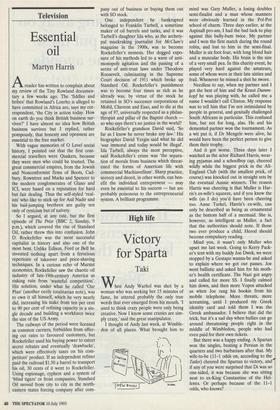Television
Essential oil
Martyn Harris
Areader has written to complain about my review of the Tiny Rowland documen- tary a few weeks ago. The 'fiddles and bribes' that Rowland's Lonrho is alleged to have committed in Africa are, says my cor- respondent, 'the City in action today. How on earth do you think British business sur- vives?' I have almost no idea how British business survives but I replied, rather pompously, that honesty and openness are essential to the free market.
With vague memories of 0 Level social history, I pointed out that the first com- mercial travellers were Quakers, because they were men who could be trusted. The great commercial empires, from the Jewish and Nonconformist firms of Boots, Cad- bury, Rowntree and Marks and Spencer to the modern conglomerates of Glaxo and ICI, were based on a reputation for hard but fair dealing. Thus the self-styled 'real- ists' who like to stick up for Asil Nadir and his bail-jumping brethren are guilty not only of cynicism but of naivety.
So I argued, at any rate, but the first episode of The Prize (BBC 2, Sunday, 9 p.m.), which covered the rise of Standard Oil, rather threw this into confusion. John D. Rockefeller was the most successful capitalist in history and also one of the most bent. Unlike Edison, Ford or Bell he invented nothing apart from a ferocious repertoire of takeover and price-shaving techniques. In a curious echo of Marxist economics, Rockefeller saw the chaotic oil industry of late-19th-century America as risking ruin from 'wasteful competition'. His solution, under what he called 'Our Plan' (another eerily totalitarian note), was to own it all himself, which he very nearly did, increasing his stake from ten per cent to 90 per cent of refining capacity in a sin- gle decade and building a workforce twice the size of the US Army.
The railways of the period were licensed as common carriers, forbidden from offer- ing cut rates to favoured customers, but Rockefeller used his buying power to extort secret rebates and eventually 'drawbacks', which were effectively taxes on his com- petitors' product. If an independent refiner paid the railroad $1.50 a barrel to transport his oil, 30 cents of it went to Rockefeller. Using espionage, cyphers and a system of `blind tigers' or front companies, Standard Oil moved from city to city in the north- eastern states forcing company after corn-
pany out of business or buying them out with SO stock.
One independent he bankrupted belonged to Franklin Tarbell, a sometime maker of oil barrels and tanks, and it was Tarbell's daughter Ida who, as the archety- pal muckraking journalist for McClure's magazine in the 1900s, was to become Rockefeller's nemesis. Her dogged expo- sure of his methods led to a wave of anti- monopoly agitation and the passing of a series of anti-trust laws under Theodore Roosevelt, culminating in the Supreme Court decision of 1911 which broke up Standard Oil. Rockefeller's punishment was to become four times as rich as he already was, by virtue of the stock he retained in SO's successor corporations of Mobil, Chevron and Esso, and to die at the age of 97, universally respected as a philan- thropist and pillar of the Baptist church so who says there's no justice in the world?
Rockefeller's grandson David said, 'So far as I know he never broke any law.' His biographer David Yergin said what he did `was immoral and today would be illegal'. Ida Tarbell, always the most perceptive, said Rockefeller's crime was 'the separa- tion of morals from business which threat- ened the forms of American life with commercial Machiavellism'. Sharp practice, secrecy and deceit, in other words, can ben- efit the individual entrepreneur — may even be essential to his success — but are probably poisonous to the entrepreneurial system. A brilliant programme.


















































 Previous page
Previous page